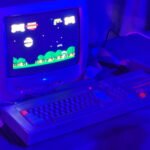This weekend marks the 40th anniversary of a very important British computer. The Acorn Electron celebrated its 40th birthday on August 25th, ,marking four decades since its release at an astonishing £199, around £700 in modern terms.
(For comparison, a Commodore 64 in 1983 would set you back around £300.)
Personally, I never owned an Acorn Electron, although in my search for an affordable BBC Micro alternative, I did consider one. These days, you can grab a used Acorn Electron on eBay for under £100. Over 200,000 of these devices were sold, all with the same Machine Operating System (MOS) as the BBC Micro series.
Conceived as a competitor to the ZX Spectrum, the Acorn Electron shipped with a cassette player/recorder for data storage, and featured a 2MHz processor with 32 KB RAM and 32 KB ROM.
The legacy of the Acorn isn’t as considerable as the BBC Micro, despite being a very similar system. Ultimately, following various revisions and expansions, it was retired in favour of the Archimedes (a system I have fond memories of). You may know that this system featured RISC OS and was the first 32-bit ARM computer (although BBC Micros had early ARM processors).
So, while the Electron might have been a budget alternative to the BBC Micro, it shares its legacy. Happy birthday, Acorn Electron!
Affiliate Disclosure: Some of the links in this post may be affiliate links, which means I may earn a small commission if you make a purchase through those links. This comes at no extra cost to you. Thank you for your support!
Christian Cawley is the founder and editor of GamingRetro.co.uk, a website dedicated to classic and retro gaming. With over 20 years of experience writing for technology and gaming publications, he brings considerable expertise and a lifelong passion for interactive entertainment, particularly games from the 8-bit and 16-bit eras.
Christian has written for leading outlets including TechRadar, Computer Weekly, Linux Format, and MakeUseOf, where he also served as Deputy Editor.
When he’s not exploring vintage consoles or retro PCs, Christian enjoys building with LEGO, playing cigar box guitar, and experimenting in the kitchen.







